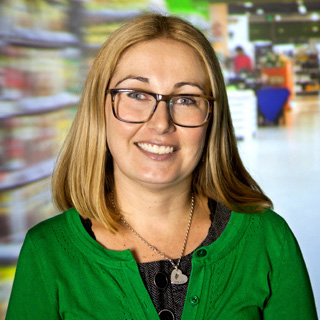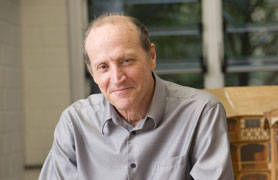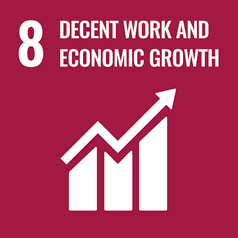Mr Shihong Hu
Visiting Occupational Trainee
School of Engineering
- Email:hu@newcastle.edu.au
Studying marine microbes to protect the planet
Ocean enthusiast, Dr Megan Huggett’s work is all about understanding the impact of climate change, pollutants and contaminants on marine ecosystems. Her focus is on microbes – the nearly invisible universe at the bottom of the ocean.
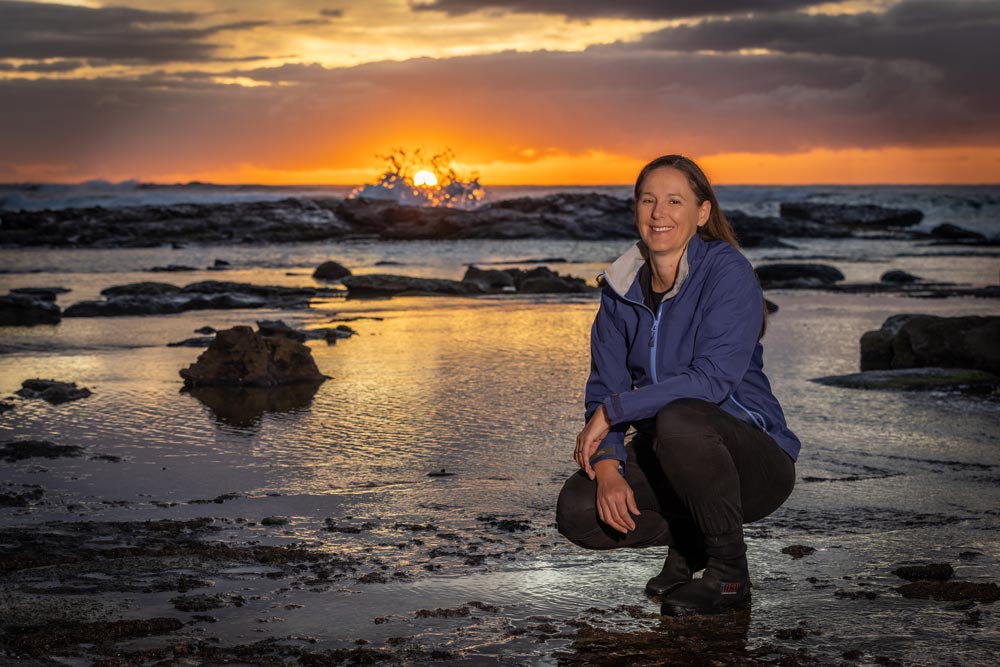
“Everything about the ocean excites and interests me,” says Megan. “The colours, the movement, the remoteness, the dangers, and most of all the living creatures that inhabit it.”
She’s interested particularly in understanding the ocean’s tiniest living inhabitants – microorganisms. They underpin the biogeochemical cycles of this planet and facilitate the health and wellbeing of the larger organisms they inhabit.
Megan’s career has spanned Australia and the US, and she has worked in five different institutions in the past two decades for her PhD, post-docs and now as a permanent academic at the University of Newcastle.
“Through my research, I’ve discovered that while the microbes of fish play a key role in the health of their host, this community is disrupted by impacts such as the history of coral bleaching, inputs of sewage, and legacy contamination by heavy metals,” she says.
She’s also found that climate-induced warming causes fish microbial communities to lose species richness and become dominated by pathogens.
Practical impacts of microbial profiling
To translate her research into actual impact, Megan works with local councils, Hunter Water, and state government agencies, such as the Department of Planning and Environment in NSW and The Department of Biodiversity, Conservation and Attractions in WA, around the impacts of water quality and stormwater.
A very practical outcome of her water quality research is to help managers understand the types of contaminants in local estuaries and the length of time they may stay in the environment.
Her work has been important in helping councils to understand the sources of nutrient inputs into waterways.
She also has international collaborators in the US, Japan and Spain on fundamental research questions about the microbial ecology of marine ecosystems to deliver globally relevant scientific outcomes.
“My research delivers globally relevant information regarding the impacts of climate change to marine ecosystems, with particular emphasis on how microbial communities will respond to future warming and other anthropogenic impacts such as metal contamination, ocean acidification and eutrophication,” says Megan.
The next project: microbes and ocean probiotics
Her national and global collaborations will continue to grow and develop despite the physical location of her office and by continuing to establish local connections within each community where she’s worked.
In the next five years, Megan plans to develop techniques to culture key marine microorganisms to understand their functional capacity and to test and predict how they’re likely to respond to environmental change.
“This will also enable me to test if some of them can be used as probiotics to help to maintain or re-establish the balance of an organism’s health, even under future environmental changes,” says Megan.
The intended outcome is to ensure the health of not only microbes but all organisms on Earth that they’re intricately linked with, relying on them for functions such as nutrition, resilience to environmental change and resistance to disease.
Training tomorrow’s marine scientists
To date, Megan has co-authored 36 journal outputs and two conference papers.
During her time as senior lecturer of the School of Environmental and Life Sciences at the University of Newcastle, she has so far secured grants and funding of $447,151 from various sources to support her living plant-protecting work.
Some of the most recent 2022/21cash injections have come from Hunter Water Corporation, The Central Coast Council, OzFish, Lake Macquarie City Council, the University of Newcastle - Research and Innovation Division, and NSW National Parks & Wildlife Service.
Megan’s goal is to deliver useful, original outcomes for the health of marine ecosystems nationally and globally via research and training the next generation of marine scientists.
“I am delighted when I see my students do well, gain confidence, publish their research in high-quality journals and grow into critical-thinking individuals who can contribute to a range of environmental issues at local, state and international levels,” says Megan.
Studying marine microbes to protect the planet
Megan’s career has spanned Australia and the US, and she has worked in five different institutions in the past two decades for her PhD, post-docs and now as a permanent academic at the University of Newcastle.
Sally Hunt - Cheers to better mental health
Dr Sally Hunt is helping to curb our nation’s alcohol addictions through evidence-based interventions—and by understanding and addressing the reasons people turn to drink in the first place.
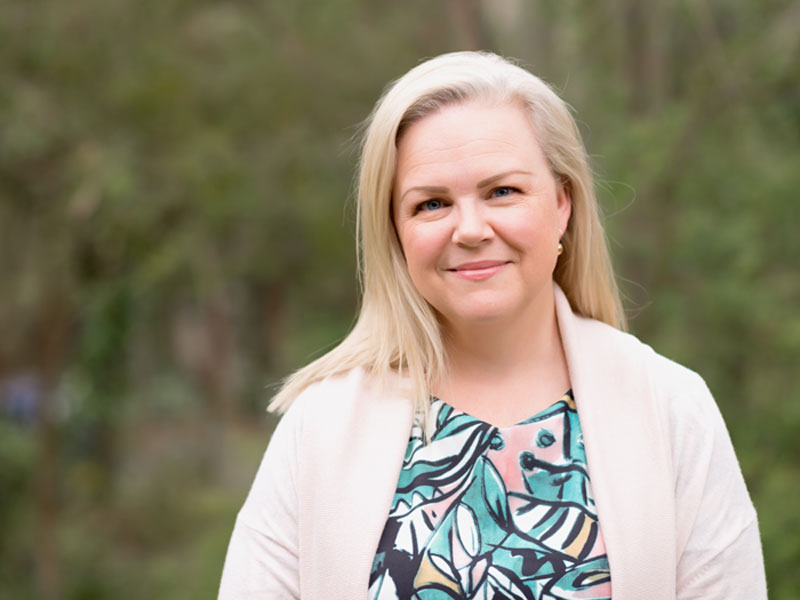
A few beers at the pub. A glass of wine with dinner. In Australia, alcohol consumption has arguably become embedded in our social culture. But what happens when drinking behaviours get out of hand?
Dr Sally Hunt is investigating the interconnected nature of mental health and substance abuse. Her work is driving innovative new prevention programs and interventions for Australians, with a focus on women’s health. It’s also sparking important, yet sometimes difficult, conversations about how much we drink and why.
“Ultimately, I would like to change the way that Australians think about alcohol so that we can make informed choices about when and how much to consume.”
The cost of alcohol abuse
As a clinical psychologist, Sally has seen the ugly side of alcohol consumption firsthand.
While she doesn’t oppose the odd glass of wine, she also understands how alcohol can become a crutch for people dealing with mental illnesses such as anxiety, or with the stresses of work and life.
But in a culture where excessive alcohol consumption is often normalised, identifying and managing alcohol abuse poses a national challenge.
“In Australia, there is a tendency to downplay the impact and associated harms of alcohol abuse—such as its contribution to around one-third of road traffic injuries—especially in comparison to known harms of other abusive substances.
“Additionally, many people downplay or aren’t aware of how much alcohol constitutes hazardous use. For example, as little as three drinks per week increases a woman’s risk of breast cancer by around 15 per cent.”
Underlying stress factors
To help combat alcohol abuse among women, Sally is investigating the primary reasons why many choose to drink in the first place. Understanding these key drivers is the first step to helping people recover their mental health and wellbeing long-term.
“My research work aims to raise awareness of the pressures experienced by many women and the role that hazardous alcohol consumption has come to play in coping with this stress.”
Sally’s research is helping to develop and implement evidence-based interventions for mental health and substance use problems that can reach a broad audience. At the same time, she’s also supporting training for early-career psychologists who treat people dealing with addictions.
“I get an enormous sense of joy from teaching early-career psychologists and providing them with the support they need to become clinicians of whom our profession can be proud.
“Alongside my role as educator, my clinical work in mental health and research settings is helping to deliver specialised psychological care for comorbid mental health and substance use problems.
“I plan to develop an evidence-based intervention specifically for women to help them manage the pressures of their lives in a healthy and sustainable way—without needing alcohol as a stress reliever.”
Getting the nation talking
As a clinical psychologist, researcher, and educator, Sally has always been passionate about helping people to regain their mental health and wellbeing. Initially, this was achieved one-by-one in the therapy room. Today, Sally’s work is reaching a much larger audience.
“Nationally, my research is starting to make an impact. I’ve been invited to speak to large audiences through radio and newspaper interviews, podcasts and conference keynote lectures.
“I am hopeful that the narrative around alcohol use—especially women’s use of alcohol—has started to change in recent years, and that my voice has contributed to that.”
So, exactly how much is too much when it comes to drinking alcohol? For those looking to prioritise their health, the age-old adage ‘everything in moderation’ is a great starting point.
“A great many alcohol related health and mental health harms would be reduced if we thought of alcohol in the same way we think about sugar—as a ‘sometimes food’. It can be enjoyable in small doses, but it’s not ideal to consume in large amounts every day.”
Sally Hunt - Cheers to better mental health
Dr Sally Hunt is helping to curb our nation’s alcohol addictions through evidence-based interventions—and by understanding and addressing the reasons people turn to drink in the first place.
Eventful research to support youth health
Professor Alison Hutton’s work is influencing the way large-scale events operate worldwide, helping to create safer and more supportive environments for young people.
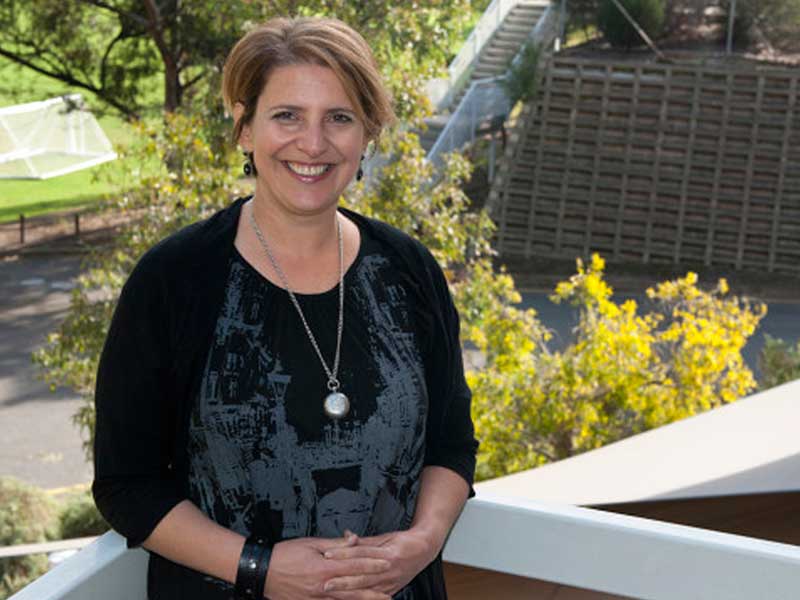
Professor Alison Hutton is passionate about youth health and safety. Backed by the likes of the World Health Organization (WHO), her work in Australia and worldwide is leading to innovative new ways of supporting young people at social events such as Schoolies, outdoor music festivals and sporting tournaments.
“Young people live in a world that is very different to when most of us grew up. Mental illness is a big issue now, so is recreational drug use, alcohol abuse, violence and unsafe sex.
“My work revolves around understanding what aspects of health are important to young people. We can then instigate supportive strategies for youth at events, such as dry zones, on-site first aid, free water and pastoral care to help young people party safely.”
It’s all about context
Outdoor events are a common coming-of-age activity for youth. Musical festivals and Schoolies are some of the biggest mass gatherings of people in Australia. And yet, these types of events can also present serious challenges and dangers.
“WHO now recognises the psychosocial implications of events. At a sporting event for example, these implications might include health behaviours such as drinking, unsafe sex and eating unhealthy foods, or depression if your team loses.
“Harm minimisation is also becoming more prevalent at outdoor music events and events like Schoolies and school formals.”
When it comes to formulating solutions, Alison asserts that context-based health strategies are more effective than telling teenagers to “just say no” to harmful behaviours. Practical forms of help and encouragement—such as dry zones at music festivals—give teenagers greater support while navigating high-risk situations.
“Young people are still developing their cognitive function. By nature, they can be impulsive and exploratory.
“Thankfully, communities are recognising that young people need support and that expecting them to comply to societal norms without support is tenacious at best.”
Reaching the masses
Alison’s work also taps into the unique potential of events to deliver critical health information to large groups.
Large-scale events can bring hundreds, even thousands of young people together in one space. This provides a valuable platform for engaging with young people and listening to their experiences—as well as delivering information and support in a way that they may be more likely to access.
“Social spaces provide safe opportunities for young people to connect with health professionals.
“The ideal is that lives will be changed because young people have the opportunity to ask questions, seek information and learn about their health in a safe, supported way. This can help to keep them out of the healthcare system and allow them to blossom into healthy young adults.”
At home and on the world stage
Alison’s work has been implemented with great success at events worldwide, including World Cup soccer matches and music festivals in Sweden, Canada and the Czech Republic.
“Thanks to our work, these large events now have health promotion tents, chill out spaces and free health promotion material.”
Alison is also busy creating safer spaces for youth here in Australia. Among her most recent projects includes a collaboration with the Kurri Kurri Youth Health Service to help mitigate youth drug use in the lower Hunter.
“The program aims to understand what young people need, and what they want to know, when it comes to drug use. Do they need safe conversations? Greater parental or teacher support? Or just a safe space to discuss drug use and ask questions?”
In both her research and teaching roles, Professor Hutton is committed to advocating for youth by listening to their challenges, providing tailored support and valuing their perspectives.
“Young people have their own voice and a lot to contribute to society—but they also need our support.”
Eventful research to support youth health
Professor Alison Hutton’s work is influencing the way large-scale events operate worldwide, helping to create safer and more supportive environments for young people.
Searching for the best of both worlds
Dr Alexis Hure is investigating ways to improve health at both ends of the lifespan.
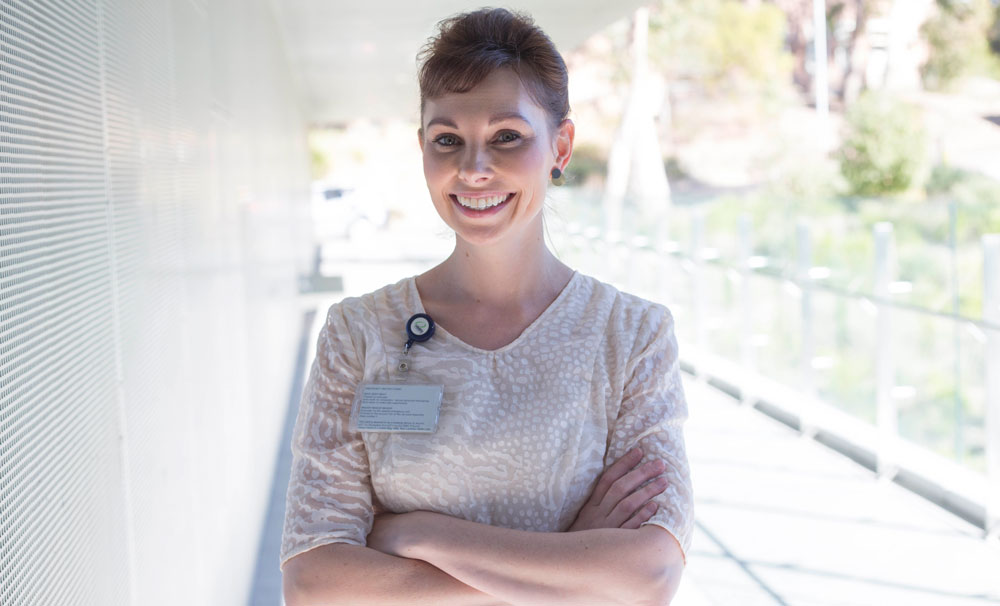
Alexis is a Novocastrian through and through, completing her undergraduate, doctorate, and post-doctoral work at the University of Newcastle.
Currently a Hunter Medical Research Institute (HMRI) Public Health Postdoctoral Research Fellow, Alexis is part of a team led by Professor John Attia on two projects in the area of medical epidemiology.
The first project is a large randomised trial looking at whether pneumococcal vaccine may prevent vascular disease. The second is focused on decreasing unnecessary pathology tests ordered through the hospital system.
“That's my epidemiology hat,” Alexis says.
“But my background is actually nutrition and dietetics - I am a dietician by training.”
In her work with mothers and babies she looks at the developmental origins of health and disease.
“What we do before pregnancy, during pregnancy and in the first two years is a critical window for setting up long term health for our children,” she imparts.
VASCULAR VACCINE
Alexis is part of the multi-institution Australian Study for the Prevention through Immunisation of Cardiovascular Events (AUSPICE) team, investigating whether the vaccine for invasive pneumococcal could reduce the risk of stroke and heart attack.
Already in use for the past 30 years to fight pneumococcal, it is hoped that the vaccine being trialed in this study is just as effective at fighting vascular disease.
Laboratory studies suggest that a component of the vaccine may be mistaken for ‘bad cholesterol’ by the body, resulting in the creation of antibodies that bind to, and reduce, actual cholesterol.
Alexis is also part of a team looking at ways to reduce the burden on our health care system by minimising the number of pathology tests ordered through the hospital system.
“While some tests for patients can take weeks or months to change, tests are often ordered in duplicate or inappropriately, which can actually harm the patient,” she says.
“Complicated hospital systems, levels of hierarchy, even upcoming electronic ordering systems all need to be assessed so that we can implement a procedure to prevent unnecessary testing.”
MATERNAL NUTRITION AS A KEY INDICATOR
Alexis’ expertise in nutrition and dietetics has been utilised across many projects and collaborations - from fetal programming and breast-feeding, to alcohol use and depression.
Her focus on mothers and babies grew partly from her interest in the work of the late Professor David Barker, who introduced the hypothesis that maternal nutrition is a key predictor of the child's long term health, particularly for things like cardiovascular disease, diabetes and hypertension.
A mother herself, Alexis wants to further understand ways to create positive maternal impacts on children’s health.
“We should be creating constructive health messages and translating guidelines into something reasonable,” she explains.
“I don’t want women thinking they are harming their baby because they ate a runny egg.”
“There some simple modifiable steps women can take, like eat plenty of fruit and vegetables when they are pregnant.”
“It’s not easy though, when all you hear about in the media is what you can’t do.”
WATCHING MOTHERS
During her PhD studies, Alexis set up the Women And Their Children (WATCH) study, a prospective longitudinal cohort of almost 180 expectant women. The purpose of this study is to generate comprehensive longitudinal data around the impact of a mother’s health during pregnancy, on the long-term health of the child.
The mothers were seen four times during their pregnancies, with ultrasounds and physical measurement data, as well as questionnaires on everything from diet to sleep patterns.
The children born to these mothers were then examined four times in the first year, then annually at 2, 3 and 4 years of age. The children also undertook cognitive testing before they began school.
“We are building this great little data set that is very comprehensive, that has been collected very methodically and very rigorously,” Alexis advises.
“It's only a small group so we can't conclusively answer questions but we can at least start asking some important questions.”
“And our learnings are transferrable, with information from WATCH being used for the Gomeroi Gaaynggal project in Tamworth for Indigenous mothers.”
SERVICES AND SUPPORT
A senior lecturer in the school of medicine and public health, Alexis enjoys teaching, supervising, and collaborating with students.
She recently teamed up with a PhD student to review drinking habits of pregnant women in Australia. Another student study focused on quantifying the helpfulness of food guidelines during pregnancy.
Both studies showed that fear campaigns create stress which may cause harm, as most women were doing the right thing.
Alexis would like to see more support services in place for women who need help modifying their behavior. This in turn will create better outcomes for their children.
“Provide help, provide support, provide strategies, provide services, don't just tell women they are doing the wrong thing all the time, that is not helpful,” she says.
As it happens, Alexis claims it’s not just the choices of mothers that predict the health and wellbeing of their children.
“I'm now looking at the activities of mothers, fathers and even grandparents, investigating how that affects the next generation in terms of their health, both in the long and short term,” Alexis says.
BOOK-ENDING THE LIFE SPAN
From work experience in Year 10, through to her newest project investigating a possible link between iron supplements and gestational diabetes, Alexis has been single minded in her commitment to understanding how what we put into our bodies, affects our bodies.
From obesity through to fetal programming, chronic disease to breast-feeding, depression to low birth weight, Alexis will continue to work across the spectrum.
In collaboration with colleagues, Alexis will continue to look at the impact the start of life can have on the end of life, and deliver new information to doctors and midwives to ensure her research is translated into practice.
With the help of her research students, she will continue monitoring the development of the WATCH cohort, using data from this and other studies to measure impacts.
Just don’t ask Alexis if she prefers the mothers and babies work to the broader field of epidemiology.
“I don’t believe it's an either/or proposition. I can do both, and for me, it is almost like book-ending the lifespan,” Alexis muses.
“I can keep working on mothers and babies projects, while focusing on improving health services so that people get the best treatment as adults.”
“It really is the best of both worlds.”
Searching for the best of both worlds
Dr Alexis Hure's research expertise are in the areas of fetal growth, breastfeeding, child nutrition, nutrition during pregnancy, diabetes, cardiovascular disea
Eat well to be well
An authority on all things digital and dietary, Dr Melinda Hutchesson is helping young adults manage their weight by pursuing mainstream nutrition from not-so-mainstream angles.
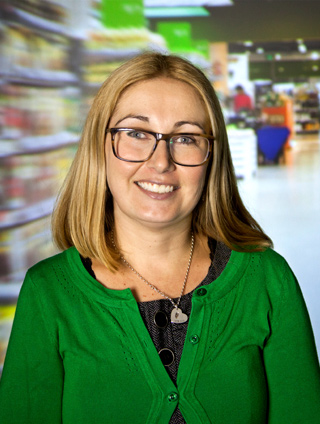
Dr Melinda Hutchesson is an advocate for technology. The National Heart Foundation Postdoctoral Fellow is also a firm believer in the compelling influence food has on our health. Ingenious but gracious, she's marrying the two in her studies, seeking to develop and evaluate weight loss and weight gain prevention interventions that can be delivered simply, digitally and effectively.
"The goal is to improve young people's eating and exercise habits," the nutrition expert affirms.
"I use inexpensive devices that potentially have a wide reach to do this, such as mobile phone applications, websites and activity monitors."
Due to its high prevalence and disease burden, obesity is a major public health priority for this 18-35 age group.
"My findings are helping guide best practice both here and abroad."
At the same time identifying a gap in these targeted services, Melinda is devoting a sizeable chunk of her research to women.
"Statistics tell us they are putting on kilos rapidly – around six on average between their 20s and 30s," she elaborates.
"So I want to get to them early."
Move it to lose it
Melinda's career began in 2008, when she undertook a PhD at the University of Newcastle. Chiefly focused on weight loss and weight loss management, her three-year probe sought to assess the value of an online program called 'The Biggest Loser Club (TBLC).'
"It provides recipes, daily workout plans with instructional videos, a calorie-tracking diary, support from field experts, and a personalised dashboard of progress charts, graphs and feedback," she explains.
"I followed the first 11,000 participants who signed up."
"The aim was to determine whether the web-based program was successful or not."
Melinda went on to help run a larger randomised control trial of TBLC after receiving her doctorate in 2011. Funded by an Australian Research Council Linkage Grant with the University and SP Health Co, the offshoot saw the accredited practicing dietician collaborate with her PhD supervisor, Professor Clare Collins from the University of Newcastle's Priority Research Centre for Physical Activity and Nutrition.
"Part of my candidature demonstrated that young adults are particularly interested in technological weight loss interventions," she reveals.
"They need to be engaged over an extended period of time, however, and the program did not do this."
"We think it comes down to suitability – it wasn't meeting their specific needs."
"The young women in the cohort were more likely to drop out and didn't lose as much weight."
I is for innovative
Currently, Melinda is evaluating a separate strategy called 'Be Positive, Be Healthe.' Informed by an online survey, the "targeted and tailored" weight loss intervention for young women was designed with the help of Professors Clare Collins, Robin Callister, Philip Morgan and Dr Geoff Skinner and Ilung Pranata.
"It was delivered using lots of different technologies, such as through texting and Facebook," she explains.
"We wanted to demonstrate the limitless potential of these digital devices – they offer novel approaches to research and practice."
Considering the importance of giving people "what they want" where health services are concerned, Melinda is in the process of testing the feasibility of recruiting participants to the program.
A theorist as well as a practitioner, Melinda also recently published a major systematic review in top journal Obesity Reviews. Conducting meta-analyses and leading an international team of investigators, the keen lecturer looked to provide "strong evidence" to support the use of eHealth technologies.
"I then presented this work at two international conferences in 2015," she adds.
"It's one of many manuscripts I hope to contribute to in the near future."
At the coalface and the cutting edge
As sensational as her research is translational, Melinda received the Vice-Chancellor's Award for Research Excellence and Innovation (Faculty of Health and Medicine) in December this year. She plans to continue the hunt for ways to best mix the digital and the dietary, seeking to utilise a variety of technologies to replicate face-to-face interactions and interventions.
"The latter are not always possible, especially for low socioeconomic and rural or remote communities," Melinda asserts.
"I would like to see targeted eHealth strategies readily available for young adults."
"Generic programs are not enough to motivate eating and exercise behaviour changes."
Eat well to be well
An authority on all things digital and dietary, Dr Melinda Hutchesson is helping young adults manage their weight by pursuing mainstream nutrition from not-so
Figures of speech
As unlikely as it sounds, literary scholar Professor Hugh Craig has enhanced his appreciation of Shakespeare through statistical analysis.
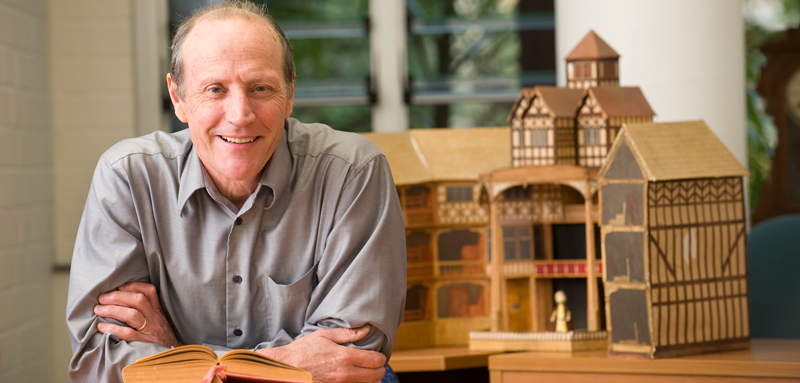
Renaissance literature expert Professor Hugh Craig is a man of letters. But the computational stylist is equally a man of numbers.
Craig is the Director of the Centre for Linguistic and Literary Computing. He has been an advocate of computer-assisted analysis of language in literature since the controversial field began to emerge in the 1980s.
He has devoted decades of research to proving that statistics can help us analyse and appreciate literary texts.
Craig says computational analysis has two applications in the field of literature: it can help authenticate authorship that is unknown or suspected to have been wrongly attributed and it can be used to build a profile of or define a writer's particular style.
"It is still controversial because people in the literary world don't like numbers, they don't trust numbers, and they don't understand how you can do something as banal as counting things in a literary context," he says.
"That is why it is fun; because it does challenge people and threaten some people. As you can imagine, I get in some pretty heated discussions."
Craig's work is based largely on frequency data and has led to several breakthrough findings in regard to Shakespearean works. Using his computational techniques he found that Shakespeare was the likely author of a number of scenes from the play The Spanish Tragedy that had previously been attributed to the playwright Ben Jonson. The results are presented in his 2009 co-edited book Shakespeare, Computers and the Mystery of Authorship.
He has also established that Shakespeare did not have the wide vocabulary many credited him with."There was a myth that Shakespeare had an extraordinarily large vocabulary, but our analysis shows that he didn't. His talent was in the way he used regular, ordinary words," Craig explains.
"What we did was look at the words he used and the frequency with which he used them and compared that to what other playwrights of the time were doing. Our research showed the difference in vocabulary was not striking."
Craig's research builds on the work of the centre's founder, Emeritus Professor John Burrows, who was the first to establish that simple function words such as "he", "and", "but" and "if" were rich in stylistic information when analysed using computational techniques.
Ina novel cross-disciplinary exercise, Craig employed the expertise of Professor Pablo Moscato, who heads the University's bioinformatics program, to assist in the analysis of texts. The pair undertook a joint project comparing the structure of language in Shakespeare's plays and poems, which returned interesting evidence of a vast disparity in style between the two literary disciplines.
He has also linked with University speech pathology researchers to study how computational linguistics can be applied in the health sphere.
"We are looking at how people's language changes with ageing but there are other researchers using the techniques to investigate how people's language changes with the onset of Alzheimer's. This could in turn lead to early detection if you could find a way to pick up on those changes in language use," he says.
Craig says computational analysis is not only applicable to the work of great writers. It can be used just as effectively to identify the idiosyncrasies of any individual's language.
"The miracle of language is that we all make something individual out of a common resource. Computer analysis allows us to detect those word patterns more accurately than simply relying on intuition."
Figures of speech
As unlikely as it sounds, literary scholar Professor Hugh Craig has enhanced his appreciation of Shakespeare through statistical analysis.
Mr Shihong Hu
Position
Visiting Occupational Trainee
School of Engineering
College of Engineering, Science and Environment
Contact Details
| hu@newcastle.edu.au |

